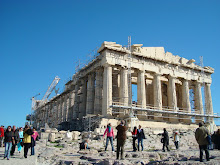O artigo abaixo é de autoria de Sarah Lyall, e com data de onze de abril
corrente, foi publicado pelo New York Times, com fotos de Sergey
Pokomarev. Com a devida vênia da autora que solicito, pela sua qualidade e
poder evocativo, essa descrição me parece demasiado importante para que não
seja levada em conta, em momento quando ainda é possível desfazer esse erro
descomunal que é o Brexit. Por isso, achei de grande importância para também
publicá-lo no meu modesto blog, para que os meus leitores entendam melhor o que
está em jogo.
St. Pancras
International railstation
A wonder of Victorian architecture resurrected for the 21st century opened ten years ago as
the embodiment of a great notion: that Britain is part of something bigger than
itself and (not belonging) to a fellowship of nations is as easy and natural as
stepping out of a train.
To catch a Eurostar from a platform in
London, slide under the English Channel, hurtle thru the French countryside and
less than 3 hours later pull into the Gare du Nord in Paris. To ride the
Eurostar was to marvel that the capitals London so prosaic and straightforward,
Paris so romantic and mysterious, the
two with their long history of rivalry and discord - were part of
the same larger enterprise.
Eurostar symbolised an era in
which London seemed so inevitably
rushing toward Europe, too. At least that was the idea until now and the
beginning of the process known as Brexit.
The trains are still running, but the era that created modern London
appears to be over.
"We've made a horrible statement
to the rest of the world, and it's very sad," said Martin Eden, a
publisher waiting to catch the Eurostar
to Paris the other day to celebrate his
43rd birthday. "We should be moving together", he said of Europe,
"instead of moving apart."
I meet with Eden as I wandered around
St.Pancras, at the moment Britain officially filed for divorce from the
European Union. It was lunch time on March 29, Brexit Day, as you might call
it, when Britain delivered a letter to Brussels and opened two years of
negotiations over the rules of disengagement.
But as Britain tries to bid farewell
to its now estranged partner of 44 years, London faces a different sort of
challenge: how a great global city whose residents voted overwhelmingly against Brexit in last summer's referendum
should adjust to an uncertain future governed by principles that feel
antithetical to its very being. Brexit has divided Britain from Europe but also
divided Britain from itself, with London on one side and (...) of England in the other
(Scotland and Northern Ireland, which also voted to remain, are another
story).
To many people in the capital, the
vote last year feels like a rejection not just of Europe but also of the values
embodied by London, perhaps the world's most vibrantly and exuberantly
cosmopolitan city: values like openness, tolerance, internationalism and the
sense that it is better to look outward than to gaze inwardly. Even as a sense of melancholy seemed
to descend on St. Pancras, when I walked around the other day, much of the rest of Britain was celebrating "A Magnificent Moment" the Daily
Telegraph announced on its front page the next morning: " Dov on its front page the next
morning: "Dover & out", said the Sac, referring to the White
Cliffs of Dover. But even as moods of the country has spoken darkly of the
influx of immigrants, the erosion of British values and the siphoning of
resources by Europe, London has remained about as heterogenous and open-minded
a place as you could imagine, especially for
a 2,000 ish year old metropolis.
Here are Britain's richest people
and many of its poorest, living side by side in relativa peace. London is still
stuffed with British landmarks - Big Ben, Buckingham Palace, St. Paul's
Cathedral - but also with people comprising 270 nationalities, 8,7 million inhabitants in all.
Brexit has thrown in disarray this
great experiment in tolerance. Nobody
can predict what the City will look like in 10, 20 or 30 years. If spontaneous
travel between Europe and Britain no longer seem so simple, neither does the
easy exchange of people, capital, jobs, businesses and languages. Perhaps more
significant, it is no longer clear that these are meant to be admissible
things, here or anywhere.
"London is a weird place at
the moment", said the writer Nikesh Shukla, whose book "The good
immigrant" is made of essays by non-white Britons about a country (of )
which they feel increasingly alienated. He lives in Bristol now, but
grew up in London, and the city, he says "feels like a uniquely
encapsulated version of what Britain means to me."
"The
government says it's trying to get the country back, but in the process it's
losing the heart of its people in
London.", Mr Shukla said in a telephone interview. "People feel
uneasy because there are a lot of futures at stake. These are people who live
in the city who contribute to society, who have families, social structure, and
financial committments, whose futures are now in doubt."
Modern
London thrives on the idea that one city can be a global melting pot, a global
trading house, a global media machine, and a place where everyone tolerates
everyone else, mostly. The thought is that being connected to the rest of the world is something to
celebrate. But what happens to London when that idea unexpectedly falls away?
(The article is part of a series examining whether Brexit
will sink a great global city)

Nenhum comentário:
Postar um comentário